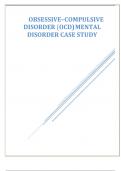OBSESSIVE–COMPULSIVE
DISORDER (OCD) MENTAL
DISORDER CASE STUDY
, I. INTRODUCTION
a. Bio data of patient
Name: Reeta rani w/o Shri Mukund lal
Age: 46 years
Gender: Female
Religion: Hindu
Address: Ladoka mandi, Fazilka
Education: 10th
Occupation: Housewife
Marital status: Unmarried
Languages known: Hindi, English, Punjabi
Monthly income: 15000/-
Date of Admission: 3/12/18
CRF: PFDGG1001060816
Mobile no. : 09780216560
Diagnosis: Obsessive compulsive disorder
Reason for admission : Treatment and evaluation purpose
Informant:
✓ Patient
✓ Reliability of Informant: reliable
b. Significance/relevance to the concept:
OCD is a disorder that has a neurobiological basis. It equally affects men, women, and children
of all races, ethnicities and socioeconomic backgrounds. In the India, the point prevalence of
OCD is 0.8. And according to the World Health Organization, OCD is one of the top 20 causes
of illness-related disability, worldwide, for individuals between 15 and 44 years of age.
c. B a c k g r o u n d k n o w l e d g e :
• Definition : Obsessive–compulsive disorder (OCD) is a mental disorder where people feel the
need to check things repeatedly, perform certain routines repeatedly (called "rituals"), or
have certain thoughts repeatedly (called "obsessions"). People are unable to control either the
thoughts or the activities for more than a short period of time. Common activities include hand
washing, counting of things, and checking to see if a door is locked.
• Clinical manifestation:
People may experience:
• Behavioural: compulsive behaviour, agitation, compulsive hoarding, hypervigilance,
impulsivity, meaningless repetition of own words, repetitive movements, ritualistic
behaviour, social isolation, or persistent repetition of words or actions
• Mood: anxiety, apprehension, guilt, or panic attack
• Psychological: depression, fear, or repeatedly going over thoughts
1
, • Also common: food aversion or nightmares
Causes: The cause of obsessive-compulsive disorder isn't fully understood. Main theories
include:
o Biology. OCD may be a result of changes in your body's own natural chemistry or brain
functions.
o Genetics. OCD may have a genetic component, but specific genes have yet to be
identified.
o Environment. Some environmental factors such as infections are suggested as a trigger
for OCD, but more research is needed.
Prognosis
The prognosis of this condition is good, with most cases improving within a year of diagnosis.
The minority of cases will developing a long-term course of the illness, fluctuating and persisting
with time. When severe, the condition can last for many years, and may be more resistant to
treatment than less severe forms of the disease.
Complications: Problems resulting from OCD may include, among others:
Health issues, such as contact dermatitis from frequent hand-washing
Inability to attend work, school or social activities
Troubled relationships
Overall poor quality of life
Suicidal thoughts and behavior
NURSE CENTERED
Objectives
Upon completion of the case study, participants should be able to:
1. Demonstrate transfer of knowledge of obsessive compulsive disorder pathophysiology,
assessment, and treatment planning to a case situation.
2. Develop a multimodal treatment plan for a patient with obsessive compulsive disorder
according to their prognosis.
3. Illustrate responsible therapy prescribing.
4. Understand complications of obsessive compulsive disorder.
2
, HISTORY OF PATIENT
1. Bio data of patient
Name: Reeta rani w/o Shri Mukund lal
Age: 46 years
Gender: Female
Religion: Hindu
Address: Ladoka mandi, Fazilka
Education: 10th
Occupation: Housewife
Marital status: Unmarried
Languages known: Hindi, English, Punjabi
Monthly income: 15000/-
Date of Admission: 3/12/18
CRF: PFDGG1001060816
Mobile no. : 09780216560
Diagnosis: Obsessive compulsive disorder
Reason for admission : Treatment and evaluation purpose
Informant:
✓ Patient
✓ Reliability of Informant: reliable
2. CHIEF COMPLAINTS:
According to records:
✓ Obsessions of symmetry
✓ Sadness
✓ Obsession for frequent hand washing X 20 years
✓ Hopelessness
✓ Loss of concentration
✓ Disturbed sleep pattern
✓ Decreased sleep
✓ Irritability
✓ Generalized body ache
✓ Constipation
3. HISTORY OF PRESENT ILLNESS:
▪ Duration : 20 years
▪ Mode of onset: Chronic
▪ Course of illness: Continuous
▪ Predisposing factors : conflicts with family and husband
▪ Aggravating factors : Loneliness in the home
3




